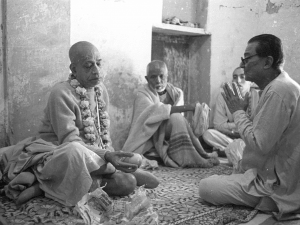Burden of love
Visakha Devi Dasi: In Visakhapatnam, on the coast of the Bay of Bengal halfway between Madras and Calcutta, Prabhupada’s Godbrothers hosted us at their temple. Here we were neither the “dancing white elephants” (Prabhupada’s phrase) before thousands at city pandals nor the gawking pilgrims of Vrindavana nor the disqualified low-borns of the Madras brahmanas. Rather, here we were taken into the bosom of the Gaudiya Vaisnava tradition, of which we were a part, and warmly welcomed. For one heavenly week, staunch Gaudiya Vaisnavas reveled in encouraging us and in praising Prabhupada’s accomplishments in introducing us to bhakti culture. From their acceptance it was clear that Prabhupada’s movement was a flower in the Vaisnava bouquet - an exotic flower, no doubt, and sometimes a pungent one, but also a prominent one, of which they were proud.
Between his public lectures, Prabhupada relaxed and joked with his Godbrothers. Once, I passed his room and saw him squatting, washing his dhoti Indian-style. Anyone of the 20 students present would have gladly done it for him, but it seemed he wanted to do it himself, that he took pleasure in it.
Both in the West and in India, devotees had converted rented apartments or buildings into temples, but the Visakhapatnam Gaudiya-matha had been designed and built as a temple and so was, from its very architecture, centered on the Deity and service to the Deity. It radiated the well-worn character of culture kept vital by genuine feeling. The temple functions went on with mature assuredness, with efficient, reverential jolliness. We 20 young, rowdy, voracious, vivacious, semi-trained westerners descended on this idyllic seaside asrama with our idiosyncratic demands (Nanda Kumar was on an all-fruit diet) and sincere misunderstandings (Malati tried to give Prabhupada a donation she'd received, but Prabhupada told her to use it for her three-year-old daughter, Sarasvati, who was traveling with us). We were surely a burden for these lifelong resident sadhus. But, smiling, they let us know we were a burden of love.
Here we were united with two dear spiritual uncles, both in their 60s: B. V. Puri Maharaja, the wispy, energetic, irrepressible, warm-hearted, wise sadhu, brimming with an appreciation for Prabhupada, who graciously overlooked our shortcomings; and Ananda Maharaja, the robust, alert, jovial sadhu who spoke no English but relished cooking and serving us elaborate feasts. His life, dedicated to helping others, welled of satisfaction. I became a great fan of both of them. They were cheerful, fresh examples of high ideals lived; their lives conveyed a message of godly and selfless service, their acceptance of us assured me, and their devotional enthusiasm humbled me. Whatever aches I felt from my recent, bumpy conversion—a choice that in India had made me even more of a spectacle than I had been as a western tourist—were soothed by the affirmations of these residents of the Visakhapatnam Gaudiya-matha.
